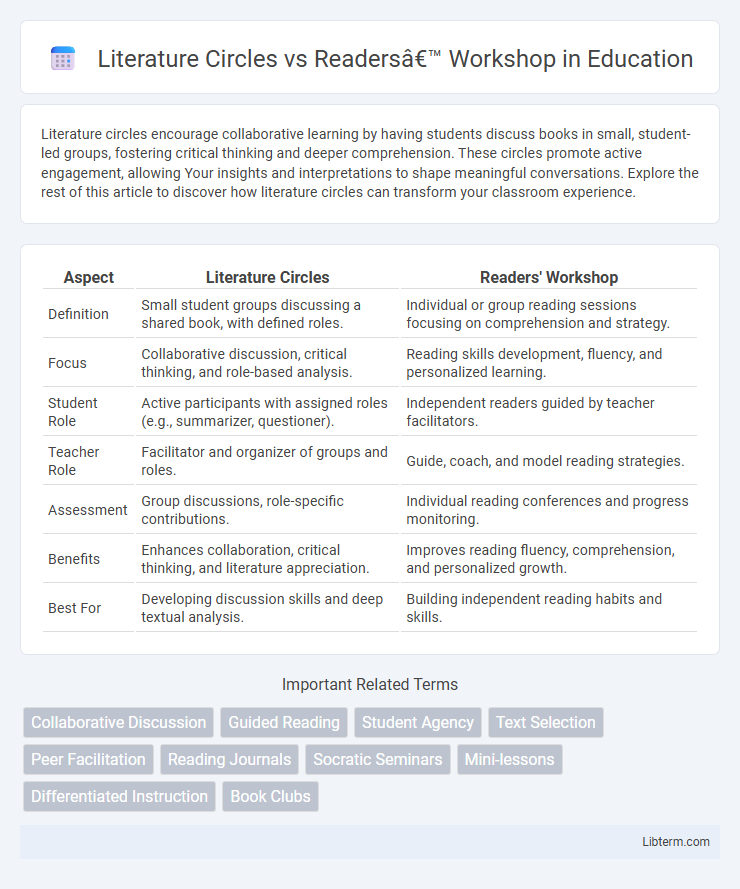Literature circles encourage collaborative learning by having students discuss books in small, student-led groups, fostering critical thinking and deeper comprehension. These circles promote active engagement, allowing Your insights and interpretations to shape meaningful conversations. Explore the rest of this article to discover how literature circles can transform your classroom experience.
Table of Comparison
| Aspect | Literature Circles | Readers' Workshop |
|---|---|---|
| Definition | Small student groups discussing a shared book, with defined roles. | Individual or group reading sessions focusing on comprehension and strategy. |
| Focus | Collaborative discussion, critical thinking, and role-based analysis. | Reading skills development, fluency, and personalized learning. |
| Student Role | Active participants with assigned roles (e.g., summarizer, questioner). | Independent readers guided by teacher facilitators. |
| Teacher Role | Facilitator and organizer of groups and roles. | Guide, coach, and model reading strategies. |
| Assessment | Group discussions, role-specific contributions. | Individual reading conferences and progress monitoring. |
| Benefits | Enhances collaboration, critical thinking, and literature appreciation. | Improves reading fluency, comprehension, and personalized growth. |
| Best For | Developing discussion skills and deep textual analysis. | Building independent reading habits and skills. |
Introduction to Literature Circles and Readers’ Workshop
Literature Circles and Readers' Workshop both foster collaborative and student-centered reading experiences, enhancing comprehension and critical thinking skills. Literature Circles involve small groups where students take on specific roles to discuss assigned texts, promoting in-depth engagement and shared responsibility. Readers' Workshop emphasizes individualized reading choice and mini-lessons, allowing learners to develop reading habits and strategies within a supportive community setting.
Defining Literature Circles
Literature Circles are small, student-led discussion groups where participants select, read, and analyze books collaboratively, promoting critical thinking and engagement through assigned roles like discussion director or summarizer. This interactive format encourages diverse interpretations and deep comprehension by fostering peer dialogue and shared responsibility for learning. Emphasizing student choice and autonomy differentiates Literature Circles from more teacher-directed models, enhancing motivation and personalized reading experiences.
Understanding Readers’ Workshop
Readers' Workshop emphasizes student choice and diverse reading strategies, fostering independent comprehension and critical thinking skills. Unlike Literature Circles, which rely on structured group discussions around assigned texts, Readers' Workshop provides flexible, individualized reading time paired with mini-lessons targeted at specific literacy skills. This approach cultivates deeper understanding and engagement by allowing readers to explore texts at their own pace while developing personalized strategies for interpreting literature.
Key Differences in Structure
Literature Circles are student-led small groups where participants select and discuss a shared book, emphasizing collaborative roles such as summarizer or connector to guide conversation. Readers' Workshop centers around individualized reading with teacher modeling, independent practice, and sharing sessions, supporting personalized literacy development. The key structural difference lies in Literature Circles' group-driven dialogue versus Readers' Workshop's balance of teacher instruction and independent reading time.
Student Roles and Responsibilities
Literature Circles assign specific roles such as Discussion Director, Summarizer, and Vocabulary Enricher, promoting collaborative responsibilities where each student contributes to in-depth book analysis. In Readers' Workshop, students take ownership as independent readers, choosing texts and setting personal goals while teachers facilitate individualized guidance and conferring. Both models emphasize active engagement, with Literature Circles fostering structured peer interaction and Readers' Workshop encouraging autonomy and self-assessment in reading practices.
Teacher’s Role and Guidance
In Literature Circles, the teacher acts as a facilitator who provides minimal guidance, encouraging students to take ownership of discussions and foster peer collaboration. In contrast, the Readers' Workshop model positions the teacher as an active guide who offers direct instruction, targeted feedback, and strategic support tailored to individual student needs. Both approaches require the teacher to balance fostering independent reading skills with promoting critical thinking and comprehension through scaffolded engagement.
Assessment and Evaluation Methods
Literature Circles primarily use peer feedback and group discussions to assess comprehension, emphasizing collaborative evaluation and critical thinking skills. Readers' Workshop incorporates individualized reading conferences and running records, providing personalized assessment of fluency, accuracy, and comprehension. Both methods combine formative assessments with student self-reflections to support ongoing literacy development.
Benefits of Literature Circles
Literature Circles foster collaborative learning by encouraging students to engage in discussion, critical thinking, and diverse perspectives around a shared text, enhancing comprehension and analytical skills. These small, student-led groups promote accountability and motivation through role assignments such as discussion director, summarizer, and connector, which deepen understanding and encourage active participation. Research indicates that Literature Circles increase student engagement and ownership of reading, supporting differentiated instruction and social-emotional development.
Advantages of Readers’ Workshop
Readers' Workshop offers personalized reading experiences by allowing students to select texts that match their interests and reading levels, enhancing engagement and comprehension. It incorporates explicit mini-lessons that target specific reading strategies, promoting critical thinking and independent reading skills. The structure supports continuous assessment through teacher-student conferences, providing tailored feedback to improve literacy development.
Choosing the Right Approach for Your Classroom
Selecting between Literature Circles and Readers' Workshop depends on your classroom goals and student needs. Literature Circles promote collaborative, student-driven discussions centered on assigned roles, enhancing critical thinking and engagement with texts. Readers' Workshop offers a flexible structure emphasizing individualized reading and teacher-guided mini-lessons, supporting differentiated instruction and fostering independent reading skills.
Literature Circles Infographic

 libterm.com
libterm.com